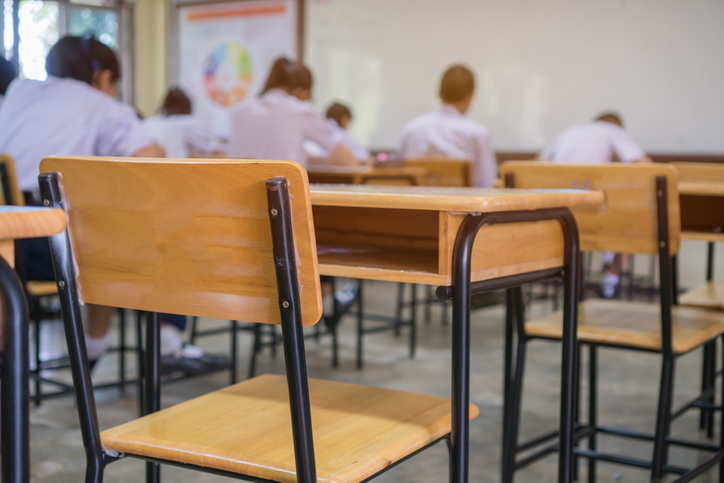Education activists are worried that time is running out for schools to reopen, and an expert says the inequality in schools means thousands of children will return to the classroom with a distinct disadvantage.

iStock
With only 171 of the up to 202 days of the school year left, the race to save the class of 2020 at South Africa’s schools is on, experts have warned.
Government is faced with the mammoth task of ensuring primary and high schools are prepared to play catch-up on the lost month of school.
On Monday morning, Education Minister Angie Motshegka postponed a much-anticipated briefing on the reopening of schools to later this week. Anticipating this announcement, the South African Democratic Teachers Union (Sadtu) called for strict safety measures to be put in place before pupils returned to school. These included adequate physical distancing space.
The Congress of South African Students (Cosas), which represents pupils in basic education, also warned that the 2020 school syllabus may not be completed this year, if the virus did not slow down substantially as institutions globally race to find a cure.
Cosas president John Macheke said: “We think we will not be able to finish this year’s syllabus the way things are at the moment. If we don’t find a cure for this disease, we will not be able to keep sending learners to school. Remember in high school we are doing seven subjects a day and they are not attended at the same time. You may attend Maths, then English then after break you have the rest of the subject. And also it will not work to have these classes in shifts, because that will compromise the safety of learners.”
The aspect of disease safety posed one of the biggest threats to the prospect of saving the school year, according to Macheke, because of a high probability that there won’t be enough classrooms or enough space in schools for adequate physical distancing.
This concern is also one of several that Schools Act lobby group Equal Education (EE) laid out as urgent considerations government should be giving answers for.
“As Motshekga and the education MECs consider reopening of schools, the likelihood is that existing inequalities within the system, such as classroom shortages, and lack of adequate access to water, sanitation, and scholar transport will prove to be significant obstacles,” says EE secretary general Noncedo Madubedube, adding that sufficient resources had to be allocated so the the return of pupils and teachers to classrooms did not compromise the health and safety of pupils and school staff.
Inequality adding to the burden
According to education specialist at the University of Pretoria, Professor Kobus Maree, catching up on school hours may prove unfairly difficult for the majority of South African pupils, who may not have had access to online distance-learning options available to those more privileged. It is therefore imperative that most schools proceed with their syllabus with the assumption that little or no learning had been taking place during the strict lockdown period.
“Virtually all institutions have to an extent used varying degrees of online distance learning, but let us be honest – in informal settlements, townships and wherever there is great financial need and few resources, people will not have been able to learn adequately and in some instances it has been impossible to learn. If 11 family members are sharing a two-bedroom shack or house, definitely learning will not take place adequately in that environment.”
Maree said the effects of this could create further inequality between those who have access to all resources for learning and those who did not.
Even without the added pressure of the pandemic, South Africa faced various pressures in its school system, including a sub-par matric pass rate. Although the matric class of 2019 achieved a pass rate of 81.3%, an improvement on the 78.2% rate its scored in 2018, dropout rates remained a concern.
Out of 1,052,080 learners who were enrolled in grade 10 in 2017, only 409,906 learners passed matric in 2019.
Time to go paperless
Meanwhile, Cosas have reiterated their call for matric pupils to be issued with tablets as the country braced for the reopening of schools.
“We know that due to various issues surrounding the coronavirus, it will be difficult for all learners to return to classrooms and we are still going to struggle to make sure that everyone catches up in the syllabus,” said Macheke.
“We have always been making the call for ‘one learner, one tablet’ but we know in our unequal society not all learners have access to this fourth industrial revolution. We therefore call for at least all of the matrics to be provided with tablets so that they can receive lessons remotely and get access to study material.”
The group also planned to roll out a back-to-school program providing fogging machines to classrooms, in order to help improve hygiene and curb the spread of the virus.
According to Maree, the lack of access to the internet and gadgets needed for distance learning did not mean that pupils using this technology for the first time would be too far behind, because it is relatively easy to grow accustomed to, provided it was accessed on time and reliably.
“The first encounter with e-learning may be downright bewildering and daunting, but after a while I can assure you that learners will get used to it, but they need practice, practice, practice and a stable online connection and a good support system from parents, in order to level the playing field.”
– simnikiweh@citizen.co.za
For more news your way, download The Citizen’s app for iOS and Android.
Download our app